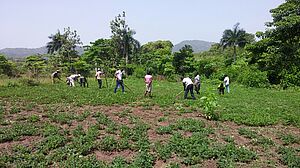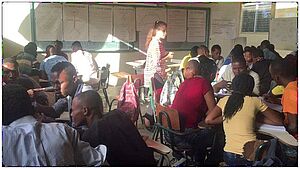Training
Training for men and women peanut farmers

Men and women peanut farmers have been using effective technologies to limit aflatoxins contamination, whether this contamination occurs on the field or after harvest. All of these technologies such as tarps, storage bags, or sorting of damaged peanut grains, have a cost.
The cost of these aflatoxins contol methods is being investigated with the farmers through a BDM auction method. The price that consumers would be willing to pay for certified peanut products is also being investigated through individual interviews. More than 275 farmers have already been trained to participate in the BDM auctions.
Students from Haitian Universities also benefit from theorical and practical trainings as part of the project. They are trained to conduct interviews with peanut farmers with a gender inclusive appproach to better target specific situations affecting women in the peanut value chain.
The AFLAH project 's gender consultant conducted training sessions with partner organizations' staff in Haiti. After the first training sessions MFK staffs conduct several training sessions on their side with peanut farmers as part of the project gender strategy implementation.
Capacities building of partner organizations


Partner organizations' staff participate in theorical and practical training on gender strategy. These training courses are designed to provide partner organizations with tools, skills and capacity to conduct interviews and focus groups that take into consideration the specific situations of women in the peanut value chain.
An administrative technician from Laval University has also started working to build the capacity of partner organizations' accounting departments to improve their operational capacities to implement the project field activities.
